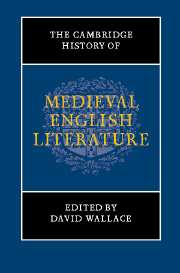Book contents
- Frontmatter
- I AFTER THE NORMAN CONQUEST
- II WRITING IN THE BRITISH ISLES
- III INSTITUTIONAL PRODUCTION
- Introduction
- 12 Monastic productions
- 13 The friars and medieval English literature
- 14 Classroom and confession
- 15 Medieval literature and law
- 16 Vox populi and the literature of 1381
- 17 Englishing the Bible, 1066–1549
- IV AFTER THE BLACK DEATH
- V BEFORE THE REFORMATION
- Chronological outline of historical events and texts in Britain, 1050–1550
- Bibliography
- Index of manuscripts
- Index
Introduction
from III - INSTITUTIONAL PRODUCTION
Published online by Cambridge University Press: 28 March 2008
- Frontmatter
- I AFTER THE NORMAN CONQUEST
- II WRITING IN THE BRITISH ISLES
- III INSTITUTIONAL PRODUCTION
- Introduction
- 12 Monastic productions
- 13 The friars and medieval English literature
- 14 Classroom and confession
- 15 Medieval literature and law
- 16 Vox populi and the literature of 1381
- 17 Englishing the Bible, 1066–1549
- IV AFTER THE BLACK DEATH
- V BEFORE THE REFORMATION
- Chronological outline of historical events and texts in Britain, 1050–1550
- Bibliography
- Index of manuscripts
- Index
Summary
Medieval texts cannot be adequately understood without reference to the institutions that generated, copied or preserved them; the place and moment of composition is often, of course, far from that of the text’s last (surviving) transfer to manuscript. Institutional discourses inform the peculiarities of literary texts; the accumulative study of such texts furthers understanding of how such institutions function. The larger imaginative construct subtending all this is the Church – specifically that Church whose infrastructures were drastically revised in the mid-sixteenth century. Much of the writing considered here – classroom exercises, penitential manuals, legal transcripts, fragments of translation – may not be considered ‘literature’ at all: but the acknowledged canonical authors of Middle English writing – notably Langland, Chaucer and the Pearl-poet – can hardly be understood as medieval English texts without reference to this under-studied, under-edited corpus, considered here under six interdependent aspects, or activities: monastic productions, friars and literature, classroom and confession, literature and law, vox populi (and the anti-institutional discourses of 1381), and Englishing the Bible.
The institutions in question here were exceptionally powerful: as powerful, perhaps, as any seen before the rise of modern multinational business corporations. One index of their power is a near-monopoly of textual production and conservation: monasteries, earlier chapters have noted, dominated the writing of history and the preservation of Old English textuality; more than half of all surviving medieval texts in Britain are monastic productions. (The term domination – from the Latin dominus, ‘master’ – is used advisedly here: the first Middle English text written by a nun has yet to be securely identified.)
- Type
- Chapter
- Information
- The Cambridge History of Medieval English Literature , pp. 311 - 315Publisher: Cambridge University PressPrint publication year: 1999



